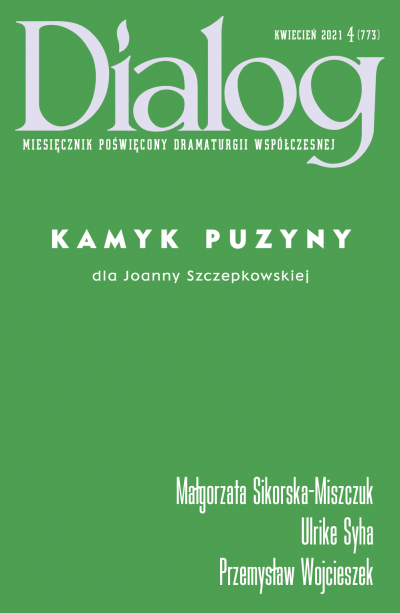Plays
Writer
Małgorzata Sikorska-Miszczuk
It is 1989. Ayatollah Khomeini condemns Salman Rushdie to death for Satanic Verses. The writer finds the sentence absurd but reality has no sense of humor. Subsequent attacks on bookstores and book translators, months of hiding, condemnation from the crowds, and, finally, fear for his relatives make Rushdie, an atheist, appear in front of a religious commission, where he makes a confession of faith. Rushdie lives to this day, although the fatwa has not been removed. The play in a disturbingly accurate manner poses questions about the freedom of speech, the social and media mechanism of the witch-hunt, and, eventually, the terror of religion, which, from the point of view of literature, is only a narrative.
When the Wasps Die
Przemysław Wojcieszek
A play about the situation of homosexual people in Poland: about love, fear, emigration and longing. The dancer Alek would be very happy with the conservative Tomek, but he cannot stand the homophobic atmosphere and leaves for Berlin. There he meets the rebellious Magda who has emigrated for the same reasons. The girl she has left behind in Poland is politically involved on the side of the ruling camp. Do we leave or stay? Fight or adapt? Wait for it to get better? Both couples ask each other these questions, and there is more and more despair in their conversations. Finally, everybody lands in Berlin but is it really a happy ending?
Drift
Ulrike Syha
The action takes place in a wealthy German land on the North Sea, in a small town whose problems might be easily trivialized: nosy neighbours, the desire to preserve the town's sleepy atmosphere but also the disappointment of outsiders that the countryside is not always bucolic. Syha describes a small seaside community, grotesquely reflecting its mental narrowness, bigotry, and attachment to the small pleasures of everyday life.
Essays, Studies
A low pain treshold
A conversation with Joanna Szczepkowska – this year’s laureate of the Konstanty Puzyna „Kamyk” Award.
Actress
Ewa Hevelke
A portrait of Joanna Szczepkowska, not as a person, but rather a persona emerging from the pages of autobiographies and press interviews. She appears to be figure composed of television and film roles – those widely available, known from public television rather than elite theatrical creations at Warsaw’s theatres.
A revolutionary and a classic
Katarzyna Waligóra
Did the positive reaction to Joanna Szczepkowska's performance at the Two Theatres Festival result from the consolidation of her position as a scandalous artist? Perhaps this is a harbinger that, after years of struggle, her rights to speak have finally ceased to be questioned. Perhaps this time, however (what could theoretically have happened to any embarrassing performance), Szczepkowska has finally found the audience who unanimously sides with her.
Waking up with the death sentence
Małgorzata Szpakowska
The conservative or, as some say, the populist turn has become apparent throughout the entire Euro-American culture. In addition, the migration of peoples in the last half-century has resulted in Islam becoming one of the components of this culture. And just as good a means of harassment as any other. This is what Małgorzata Sikorska-Miszczuk’s Writer is about: the mixing of cultures and the dissemination of idiosyncrasies.
Imposing order and establishing meaning
Dobrochna Ratajczakowa, Piotr Morawski and Piotr Olkusz talk about the history of theatre: how it is made, why, and what are the consequences of who writes these stories and how.
Theatrology. Love and crime
Stanisław Godlewski
The fact that violence in theatrical institutions is so widespread and has been present for so long is the result of a variety of favorable conditions. They are of a cultural, political, institutional, and finally psychological nature. The status of researchers and critics in this system, their activity based on certain beliefs and sometimes not expressed directly assumptions, is also an element that creates (consciously or not) these favorable conditions.
What ethics?!
Monika Kwaśniewska
In Stanisławski's system, an actor becomes a subject of an artistic process and a priest of art only thanks to hard, uninterrupted work. Subjectivity, however, should not be confused with individualism. After all, the second process accompanying the actor’s empowerment is subjugation. The principles of the subject's functioning are imposed by the master (director) who, by definition, does not work for his/her own good and fame, but for art. The reverse of submission is a moral and professional fall, causing disgust and contempt. In such conditions, it is really difficult to oppose anything.
Playwright does not die, or distress
Lukas Linder
Paving its way to the peaks of all fields of art, contemporary theatre constantly stumbles over an irritating anachronism: playwrights. The situation here is as with celibacy in the Catholic Church: if they already exist, it is not easy to get rid of them, even if everyone suffers because of it. First and foremost, playwrights themselves.
Dramaturgy of violence
Justyna Lipko-Konieczna
In Malina Prześluga's Idiot the disgust of dissimilarity is so effectively created that it, in fact, strengthens stereotypes related to persons with intellectual disability and thus may result in further deepening exclusion of this group from social life. Disgust is also such a strong reaction to the difference inherent in the text that the questions about the nature of good and evil, asked by the characters in the first scene in the context of the division into people and all, are very strongly marked by this ambivalence.
An open letter on “Idiot”
Anna Dodziuk van Kooten
Present in Malina Prześluga’s Idiot, intellectual dishonesty and moral carelessness, which lead to increased social exclusion of people with intellectual disabilities, has failed to be recognized by theatre circles. Many sensible and noble actions taken over the years are aimed at reducing the exclusion and thus making the world a better place for all of us. Malina Prześluga’s Idiot works exactly the opposite way.
Columns
Tadeusz Nyczek, Marek Beylin, Pedro Pereira
Varia
Notes on plays: Ireneusz Grzyb Pies; Robert Badinter Les briques rouges de Varsovie; Tanja Šljivar Kao i sve slobodne djevojke; Playbill; Library



